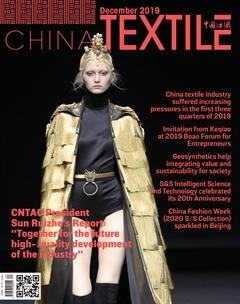Dear readers
Its December, the time when we are approaching to the end of this decade, heralding a new decimal year-mark. China habitually observes lustrum system with plans, tasks, actions and achievements based on five-year data in shortterm programs for economic and social development, and the textile industry is expected to accomplish in 2020 what was planned five years ago when it started to work out an ambitious blueprint for realizing a strong country in textile sector next year, and it is out of question that this dream of from-big-to-strong textile country is to be made true in due course.
A textile power can be defined by the economic indicators in many aspects, out of which the scientific and technological contribution to the industrial growth is a cut above all the contributing factors that include branding strength, sustainability and talents-strong human resources. In view of the whole country, China has made much headway in scientific and technological innovation capability in recent years, and 2018 witnessed an increase of R & D expenditure, representing 2.18 percent share in gross domestic product (GDP), and 4.19 million R&D persons, a professional workforce calculated on full-time jobs, which takes up the first place in the number of population engaged in R&D on global basis. China was ranked No.18 in the Worlds Most-Innovative Economies (Bloombergs Index) last year, and up to No.16 in its new rankings in Bloombergs new WMIE Index in 2019, totally scoring 78.35, with the breakdowns itemized scoring in R&D intensity for 14, manufacturing value-added for 13, productivity for 47, high-tech density for 11, tertiary efficiency for 6, researcher concentration for 39, and patent activity for 2. Besides, China is ranked No.1 in the number of its 1.54 million patent applications for invention, making up 46.4 percent of the world total.
China National Textile and Apparel Council (CNTAC), a national non-government organization with textile company membership across the country, is a resolute and authoritative campaigner for promoting scientific and technological progress in the textile industry, and its annual awarding ceremony for the technological and innovative breakthroughs in the research, education and applications is nothing short of the pride, honor and campaign of national level and respect for the great jobs done by the companies, universities and the people working in scientific and technological fields for their professional accomplishments in high-performance and functional fiber and its application, digitalized and artificial intelligence, sustainability, standards and synergic innovation, education and academic achievements, underwear innovative contribution and skilled workers training etc. as is categorized by the awards scheme at the year-end textile science, technology and education awards ceremonial conference that was just concluded in Beijing on Dec. 6th, 2019.
According to the new data from the 4th National Economic Census finished in 2018, there are 329,000 textile and apparel companies, 10.1 percent share in national manufacturing sector, providing 110.32 million jobs, and up to 161.2 million employments if textile and apparel retail jobs are included. Last year saw an investment in R&D for 47.1 billion Yuan (roughly 6.8 billion dollars at current rate), with R&D intensity at 0.88 percent, up by 0.41 percent as against 5 years ago. Although textile industry is still a labor-intensive manufacturing sector, it is noteworthy that the total fixed assets have increased by 404.7 billion Yuan (about $58 billion) while the number of employment has reduced by 3.675 million jobs, which indicates a growing factor results from technological efficiency and progress, a well-proven argument that textile scientific and technological innovation can make us strong.
ZHAO Hong Editor-in-Chief
December, 2019
- China Textile的其它文章
- Together for the future high-quality development of the industry
- The economic operation pressure of the textile industry increased in the first three quarters of 2019
- Belt and Road Textile Conference 2019
- Capacity cooperation in textile and apparel industry in Lancang–Mekong River six countries officially begins
- Invitation from Keqiao at 2019 Boao Forum for Entrepreneurs
- Ningbo:Showcasing its way into leading the trend

